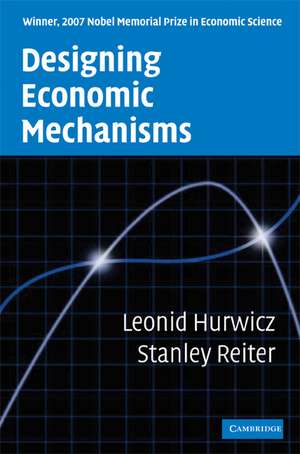Designing Economic Mechanisms
Autor Leonid Hurwicz, Stanley Reiteren Limba Engleză Paperback – 2 mar 2008
| Toate formatele și edițiile | Preț | Express |
|---|---|---|
| Paperback (1) | 351.74 lei 6-8 săpt. | |
| Cambridge University Press – 2 mar 2008 | 351.74 lei 6-8 săpt. | |
| Hardback (1) | 781.98 lei 6-8 săpt. | |
| Cambridge University Press – 21 mai 2006 | 781.98 lei 6-8 săpt. |
Preț: 351.74 lei
Nou
Puncte Express: 528
Preț estimativ în valută:
67.31€ • 70.45$ • 56.02£
67.31€ • 70.45$ • 56.02£
Carte tipărită la comandă
Livrare economică 31 martie-14 aprilie
Preluare comenzi: 021 569.72.76
Specificații
ISBN-13: 9780521724104
ISBN-10: 0521724104
Pagini: 356
Dimensiuni: 152 x 227 x 18 mm
Greutate: 0.48 kg
Ediția:1
Editura: Cambridge University Press
Colecția Cambridge University Press
Locul publicării:New York, United States
ISBN-10: 0521724104
Pagini: 356
Dimensiuni: 152 x 227 x 18 mm
Greutate: 0.48 kg
Ediția:1
Editura: Cambridge University Press
Colecția Cambridge University Press
Locul publicării:New York, United States
Cuprins
1. Mechanisms and mechanism design; 1.1. Introduction to mechanisms and mechanism design; 1.2. Environments and goal functions; 1.3. Mechanisms: message exchange processes and game forms; 1.4. Initial dispersion of information and privacy preservation; 1.5. Mechanism design; 1.6. Mechanism design Illustrated in a Walrasian example; 1.7. The rectangles method applied to the Walrasian goal function-informal; 1.8. Introductory discussion of informational efficiency concepts; 1.9. Regulation of logging in a national forest - an example of mechanism design; 2. From goals to means: constructing mechanisms; 2.1. Mechanism construction: phase one; 2.2. Phase two: constructing decentralized; 2.3.1. Flagpoles-principles; 2.4.1. Phase two: via condensation: principles; 2.5. Overlaps; 2.6.1; Main results; 3. Designing informationally efficient mechanisms using the language of aets; 3.1. Introduction; 3.2. Mechanism design; 3.3. Mechanisms and coverings; 3.4. A systematic process (an algorithm) for constructing and rRM covering; 3.5; Transversals; 3.6. Coverings and partitions; 3.7. Informational efficiency; 3.8. Example 1.9 revisited - a graphical presentation; 3.9. Informationally efficient mechanisms with strategic behavior; 4. Revelation mechanisms (co-authored with Kenneth R. Mount); 4.1. Introduction; 4.2. Initial set theoretic constructions; 4.3. The topological case; 4.4. Proofs and examples.
Recenzii
'Economic mechanism design has both theoretical and practical importance. This book, by two founders of the field, provides a wonderful guide for those who would design mechanisms. It is a major achievement, providing deep insights based on the authors' experience and wisdom. It should be required reading for all.' John Ledyard, California Institute of Technology
'This book shows how a mechanism designer, given the organization's goal, can construct a decentralized mechanism, wherein no agent directly reveals private information and yet, through message exchanges that are minimal (in an appropriate sense), enough information is gathered so that goal-fulfilling actions can be taken.' Thomas A. Marschak, University of California, Berkeley
'In this masterly and important book, Leonid Hurwicz, the founder of the theory of mechanism design, and Stanley Reiter, a leading pioneer in the field, consolidate their long-standing collaboration on how to design mechanisms that achieve society's allocational goals.' Eric Maskin, Nobel Laureate, Princeton University
'The introduction to economic theory of mechanism design, the formal analysis of economic institutions, is one of the most important developments in economics in the last half century. This book both describes and extends the state of understanding in a large and important segment of mechanism design and will define the frontier of the area for some time to come.' Andrew Postlewaite, University of Pennsylvania
'This book's innovative techniques can be useful for finding feasible solutions in both theoretical and applied statistical multivariable optimization problems.' Stan Lipovetsky, Technometrics
'This book shows how a mechanism designer, given the organization's goal, can construct a decentralized mechanism, wherein no agent directly reveals private information and yet, through message exchanges that are minimal (in an appropriate sense), enough information is gathered so that goal-fulfilling actions can be taken.' Thomas A. Marschak, University of California, Berkeley
'In this masterly and important book, Leonid Hurwicz, the founder of the theory of mechanism design, and Stanley Reiter, a leading pioneer in the field, consolidate their long-standing collaboration on how to design mechanisms that achieve society's allocational goals.' Eric Maskin, Nobel Laureate, Princeton University
'The introduction to economic theory of mechanism design, the formal analysis of economic institutions, is one of the most important developments in economics in the last half century. This book both describes and extends the state of understanding in a large and important segment of mechanism design and will define the frontier of the area for some time to come.' Andrew Postlewaite, University of Pennsylvania
'This book's innovative techniques can be useful for finding feasible solutions in both theoretical and applied statistical multivariable optimization problems.' Stan Lipovetsky, Technometrics
Notă biografică
Descriere
This book presents methods for designing institutions that direct and co-ordinate economic activity to achieve specified goals.

















